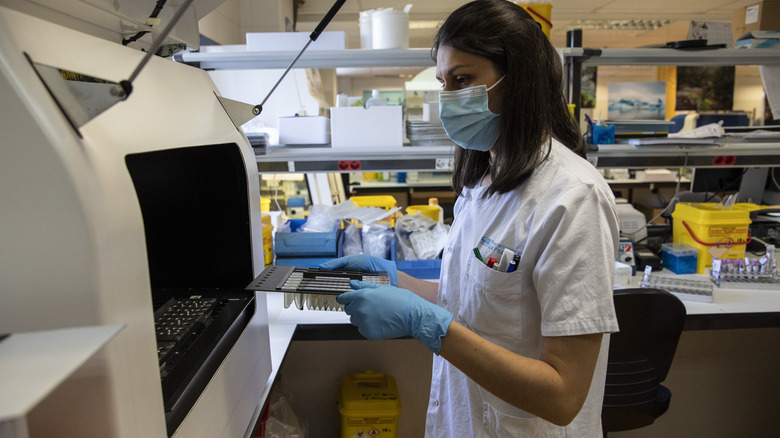How Much Money Do Lab Technicians Make?
If you are interested in the medical field but don't want to spend several years in school to become a doctor, you may want to consider becoming a lab technician. A lab technician, or as they are more technically called, a medical laboratory technologist, may not have the "doctor," title, but they are extremely important when it comes to the diagnosis and treatment of a person's ailments. At the baseline, a lab technician is responsible for collecting samples of blood and other bodily tissues and fluids, per The Balance Careers. They then test these substances and work with a physician to understand what they may mean for the patient.
But, according to Brookline College, a lab technician plays a vital role in healthcare. They are often at the frontline of a diagnosis and work with the team to create the best course of action. On any given day, a lab technician could be analyzing samples, operating medical equipment, logging data, discovering abnormal test results, or working with physicians.
Interested in becoming a lab tech? Here's what you can expect to make.
Lab technicians may be on the medical team, but their salaries are not
Lab technicians may be a vital resource for physicians, but they don't have as much training as medical doctors. Because of this, the salary ranges for lab technicians are much lower than their medical counterparts, like the doctors and nurses they work with. According to The Balance Careers, the median salary for a lab tech in the United States is around $53,120, compared to the average salary for a medical doctor, which is about $208,528, per ZipRecruiter. Many lab technicians are paid hourly, and according to Indeed, you can expect an average hourly rate of $20.57.
Of course, your pay is largely determined by where you work and who you work for. There are a variety of companies in the medical sector that employ medical lab technicians, and medical equipment manufacturing companies often pay their lab technicians the highest. If you go this route, you can expect to be paid a bit more as the average salary is $66,450, per Brookline College. Specialty hospitals, surgical hospitals, and outpatient care centers also pay a bit more than a medical or diagnostic lab.
What it takes to become a lab technician
While you may not be paid as highly as your physician coworkers are, you also won't have to spend as much time in school or accrue as much student loan debt as a lab technician. According to Indeed, it's a good idea to earn a bachelor's degree if you want to pursue a career in this field, but many places will accept someone with an associate's degree if they have the right skills. Some states require a lab technician to have a certificate, per The Balance Careers. You can earn that certificate through the American Society of Clinical Pathology (ASCP) Board of Certification or the American Society for Clinical Laboratory Science (ASCLS).
In addition to your schooling, a lab tech should be a great critical thinker and have a desire to solve problems. Attention to detail and good listening skills are also a plus. Once you are hired, you can expect to spend a lot of time on your feet, so prepare to invest in some comfy shoes that are good for standing all day in.
Also be warned that it may be trickier to set work and home-life boundaries as you may be expected to work on the weekends or holidays, especially if you work for a hospital that is always open. While the job can be demanding at times, being a lab technician is a very rewarding career with an excellent job outlook.


